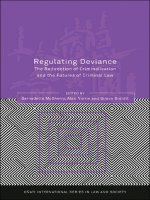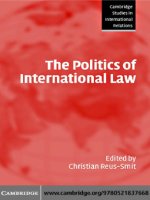Imperialism, Sovereignty and the Making of International Law Part 1 pdf
Bạn đang xem bản rút gọn của tài liệu. Xem và tải ngay bản đầy đủ của tài liệu tại đây (363.14 KB, 35 trang )
This page intentionally left blank
Imperialism, Sovereignty and the Making of
International Law
This book examines the relationship between imperialism and
international law. It argues that colonial confrontation was central to
theformation of international law and, in particular, its founding
concept, sovereignty. Traditional histories of the discipline present
colonialism and non-European peoples as peripheral concerns. By
contrast, Anghie argues that international law has always been
animated by the ‘civilizing mission’ the project of governing
non-European peoples. Racial discrimination, cultural subordination
and economic exploitation are constitutively significant for the
discipline, rather than aberrations that have been overcome by
modern international law. In developing these arguments, the book
examines different phases of the colonial encounter, ranging from the
sixteenth century to the League of Nations period and the current
‘war against terror’. Anghie provides a new approach to the history of
international law, illuminating the imperial character of the discipline
and its enduring significance for peoples of the Third World.
antony anghie is Professor of Law at the S. J. Quinney School of
Law, University of Utah. He received his LLB (Hons.) and BA (Hons.)
degrees from Monash University, Melbourne, Australia, and his SJD
degree from Harvard Law School. He practised law for several years in
Melbourne, and now teaches Contracts and various subjects in the
International Law curriculum, including International Business
Transactions and International Environmental Law. He has served as a
tutor at Monash and Melbourne Universities, where he has taught
Development Politics and International Relations; and as a Teaching
Fellow at Harvard College where he has taught International
Relations. He also served as Senior Fellow at Harvard Law School and a
Visiting Professor at the University of Tokyo. He is a member of the
Third World Approaches to International Law network of scholars.
c ambridge studies in international and comparative law
Established in 1946, this series produces high-quality scholarship in the fields
of public and private international law and comparative law. Although these
are distinct legal subdisciplines, developments since 1946 confirm their
interrelation.
Comparative law is increasingly used as a tool in the making of law at
national, regional and international levels. Private international law is now
often affected by international conventions, and the issues faced by classical
conflicts rules are frequently dealt with by substantive harmonisation of law
under international auspices. Mixed international arbitrations, especially those
involving state economic activity, raise mixed questions of public and private
international law, while in many fields (such as the protection of human rights
and democratic standards, investment guarantees and international criminal
law) international and national systems interact. National constitutional
arrangements relating to ‘foreign affairs’, and to the implementation of
international norms, are a focus of attention.
The Board welcomes works of a theoretical or interdisciplinary character,
and those focusing on the new approaches to international or comparative law
or conflicts of law. Studies of particular institutions or problems are equally
welcome, as are translations of the best work published in other languages.
General Editors James Crawford SC FBA
Whewell Professor of International Law, Faculty of Law, and
Director, Lauterpacht Research Centre for International Law,
University of Cambridge
John S. Bell FBA
Professor of Law, Faculty of Law, University of Cambridge
Editorial Board Professor Hilary Charlesworth Australian National University
Professor Lori Damrosch Columbia University Law School
Professor John Dugard Universiteit Leiden
Professor Mary-Ann Glendon Harvard Law School
Professor Christopher Greenwood London School of Economics
Professor David Johnston University of Edinburgh
Professor Hein Kötz Max-Planck-Institut, Hamburg
Professor Donald McRae University of Ottawa
Professor Onuma Yasuaki University of Tokyo
Professor Reinhard Zimmermann Universität Regensburg
Advisory Committee Professor D. W. Bowett qc
Judge Rosalyn Higgins qc
Professor J. A. Jolowicz qc
Professor Sir Elihu Lauterpacht cbe qc
Professor Kurt Lipstein
Judge Stephen Schwebel
A list of books in the series can be found at the end of this volume.
Imperialism, Sovereignty and the
Making of International Law
Antony Anghie
S. J. Quinney School of Law, University of Utah
Cambridge, New York, Melbourne, Madrid, Cape Town, Singapore, São Paulo
Cambridge University Press
The Edinburgh Building, Cambridge , UK
First published in print format
- ----
- ----
© Antony Anghie 2004
Information on this title: www.cambrid
g
e.or
g
/9780521828925
This book is in copyright. Subject to statutory exception and to the provision of
relevant collective licensing agreements, no reproduction of any part may take place
without the written permission of Cambridge University Press.
- ---
- ---
Cambridge University Press has no responsibility for the persistence or accuracy of
s for external or third-party internet websites referred to in this book, and does not
guarantee that any content on such websites is, or will remain, accurate or appropriate.
Published in the United States of America by Cambridge University Press, New York
www.cambridge.org
hardback
eBook (EBL)
eBook (EBL)
hardback
Formyparents
Contents
ForewordJamesC.Crawfordpagexi
Acknowledgementsxiv
Table of cases xvi
Table of treaties xix
Introduction 1
1FranciscodeVitoriaandthecolonialoriginsof
international law 13
Introduction 13
Vitoria and the problem of universal law 17
War,sovereigntyandthetransformationoftheIndian23
Conclusion28
2Findingtheperipheries:colonialismin
nineteenth-century international law 32
Introduction 32
Elements of positivist jurisprudence 40
Defining and excluding the uncivilized 52
Native personality and managing the colonial
encounter 65
Reconceptualizing sovereignty 100
3Colonialismandthebirthofinternational
institutions: the Mandate System of the League
of Nations 115
Introduction 115
The creation of the Mandate System 119
vii
viii c ontents
TheLeagueofNationsandthenewinternationallaw123
The Mandate System and colonial problems 136
The Mandate System and the construction of the
non-European state 147
Government, sovereignty and economy 156
The mandate and the dissolution of sovereignty 179
The legacies of the Mandate System: toward the
present 190
Conclusion194
4Sovereignty and the post-colonial state 196
Introduction 196
Decolonization and the universality of international
law 199
Development,nationalismandthepost-colonialstate204
Developmentandthereformofinternationallaw207
Permanent sovereignty over natural resources and
theNewInternationalEconomicOrder211
The 1962 Resolution on PSNR 216
The1974CharterofRightsandDutiesAmongStates220
Colonialismandtheemergenceoftransnationallaw223
Sources of law and international contracts 226
Overviewandconclusions235
5Governance and globalization, civilization
and commerce 245
Introduction245
Good governance and the Third World 247
Governance, human rights and the universal 254
International financial institutions, human rights
and good governance 258
InternationalfinancialinstitutionsandtheMandate
System 263
Conclusions and overview 268
6Onmaking war on the terrorist: imperialism
as self-defence 273
Introduction 273
The war against terrorism 274
The United States and imperial democracy 279
c ontents ix
Historical origins: war, conquest and self-defence 291
Terrorism and the United Nations: a Vitorian moment 298
Terrorism, self-defence and Third World sovereignty 303
Conclusion 310
Bibliography 321
Index 342
xii foreword
of the non-Western world. In the process the concept of ‘civilization’
was used as a form of the exclusion of non-Western values, of non-Western
identity and even of legal personality. This process can be traced through
writers such as Westlake just as much as through statesmen such as
Bismarck or events such as the Maori wars.
The third episode is that of the Mandate System under the League of
Nations, the beginning of the reversal of colonization that was effectively
completed under the United Nations. Under the guise of a ‘sacred trust
of civilization’, Western powers (and Japan) under nominal international
tutelage applied the concept of the sacred trust to effect the reality of
exploitation. The 1992 Nauru Case is an illustration, even if it is one for
which a modicum of compensation was, uniquely, obtained after the
event.
1
And when, after a long process, independence was achieved (for all
but one of the mandated territories
2
) and extended beyond the original
list of mandates to all colonial territories, the independence that was
granted turned out to be less than it seemed. The newly independent
states (this is the fourth episode) fought to develop new rules, even a
new international economic order. But in the event the Bretton Woods
Institutions triumphed, imposing their own view of development and a
certain set of structures of governance on half the world’s population
and a majority of its governments. The outcome has been, on the whole,
increased indebtedness and new forms of dependence.
Finally (for the time being) we have the war on terrorism, a new
form of branding of a significant fraction of the world, in particular
the Muslim world, as barbarian and as enemies. In Dr Anghie’s words,
‘law in the name of security, reproduces a new form of imperialism.’
Moreover it is a new imperialism in which neo-conservatism vies with
neo-liberalism in the assertion of control.
International lawyers have always assumed that their subject existed
bc (before colonization), just as they have tended to assume its flores-
cence, as yet open and undetermined, in our time of ad (after decoloniza-
tion). Anghie’s thesis is that we live still in a common era of Continued
Empire (ce), albeit under new forms. Not everyone will agree with his
argument, or that each of his chosen instances necessarily exemplifies it.
Evidently there is a measure of generalization and simplification. There
1
Certain Phosphate Lands in Nauru (Nauru v. Australia), ICJ Reports 1989 p. 15. Following the
decision the claim was settled by Australia, with subsequent contributions from the
two partner governments.
2
Palestine is still the exception.
foreword xiii
are many differences among ‘Third World’ states, and we should resist
equating ‘Third World’ with ‘the countries that lack governance’ or those
in which ‘development has failed’; otherwise debates about governance
and development will become viciously circular.
It must be admitted that the general theme of the work that ‘[t]he
colonial history of international law is concealed even when it is repro-
duced’ is sobering. The book is not, however, unrelievedly pessimistic.
In Anghie’s view ‘the Third World cannot abandon international law
because law now plays such a vital role in the public realm in the
interpretation of virtually all international events’. It may be doubted
whether ‘it is possible to create an international law that is not impe-
rial’, and faith in the future is hardly balanced by our recorded history
of good works. But the fact remains that, although not under circum-
stances of their own choosing, people and communities do nevertheless
make their own history; indeed they are condemned to do so. An under-
standing of those circumstances, we may hope, may help prevent their
endless repetition under new forms. In this way, we can read Anghie as
challenging us to think of ways of creating a non-imperial international
law.
James Crawford
Lauterpacht Research Centre for International Law
University of Cambridge
acknowledgements xv
or worse, possible. His vision and dedication created a remarkable SJD
programme at Harvard Law School, which supported not only my own
scholarship, but that of many other younger scholars whose important
and innovative work was uniquely appreciated and encouraged. I am
indebted to two institutions in particular. My colleagues at the S. J.
Quinney School of Law, at the University of Utah, through their kind-
ness and support, provided an ideal environment in which I could pur-
sue my work, as did the Graduate Programme at Harvard Law School
and all the people associated with it during the five years I spent there.
Mike Truman and Aaron Jordan provided both superb research assis-
tance and much-needed organization. John Bevan and Laura Ngai of the
S. J. Quinney law library were indefatigable in locating and providing me
with the most obscure and elusive materials. The University of Utah pro-
vided me with a Faculty Fellowship and sabbatical leave that made my
research possible during the last stages of the writing of this work. The
S. J. Quinney School of Law provided me with financial support through
the Summer Stipend Program. My thanks to the University of Tokyo and
Onuma Yasuaki for enabling me to spend three valuable months at the
University of Tokyo. I am also very grateful to James Crawford who was
kind enough to write the Foreword to this book, and who also made
several valuable suggestions and corrections. At Cambridge University
Press, many thanks to Finola O’Sullivan, Jane O’Regan, Mary Leighton
and Barbara Docherty for their patience and professionalism. This book
was completed in February 2004.
Partsofthis book have been previously published, in somewhat dif-
ferent form, as ‘Francisco de Vitoria and the Colonial Origins of Inter-
national Law’, 5(3) Social and Legal Studies,321 336 (1996); ‘Francisco
de Vitoria and the Colonial Origins of International Law’, in Laws of
the Postcolonial, edited by Eve Darian-Smith and Peter Fitzpatrick, Uni-
versity of Michigan Press (1999), pp. 89 109; ‘Finding the Peripheries:
Sovereignty and Colonialism in Nineteenth Century International Law’,
40(1) Harvard International Law Journal (Winter 1999), 1 80; ‘Colonialism
and the Birth of International Institutions: Sovereignty, Economy and
the Mandate System of the League of Nations’, 34(3) NewYork University
Journal of International Law and Politics (Spring 2002), 513 633. Omnia pro
deo.
table of cases xvii
Legality of the Threat or Use of Nuclear Weapons,
Advisory Opinion, ICJ Reports 1996, p. 226 273,293,305
Lighthouses in Crete and Samos (France v. Greece), 1937 PCIJ Ser.
A/B, No. 71 181
Lockerbie Case, see Questions of Interpretation and Application
of the 19th Montreal Convention
Military and Paramilitary Activities in and against Nicaragua
(Nicaragua v.United States), ICJ Reports 1986, p. 14 304
Nabob of Arcot v. The East India Company, 3 Bro. C.C. 292; 29
Eng. Rep. 544 (1791), reprinted in (1967) 6 British International
Law Cases 281 68
Nicaragua Case, see Military and Paramilitary Activities in and
against Nicaragua
Nuclear Weapons Case, see Legality of the Threat or use of
Nuclear Weapons
Petroleum Development Ltd. v. The Sheikh of Abu Dhabi (1951)
18 I.L.R. 144 226
Questions of Interpretation and Application of the 1971
Montreal Convention Arising from the Aerial Incident at
Lockerbie (Libya v. U.K.; Libya v. U.S.), ICJ Reports 1992, p. 114
(Order of 14 April) 299
R. v. Crewe, 2 Eng. Rep. 576 (K. B. 1910) Ruler of Abu Dhabi v.
International Marine Oil Co. (1953) 20 I.L.R. 534 89
Ruler of Qatar v. International Marine Oil Co. (1953)
20 I.L.R. 534 226, 227
South West Africa (Ethiopia v. South Africa; Liberia v. South
Africa), ICJ Reports 1962, p. 319 (preliminary objections,
judgement) 149, 154
South West Africa (Ethiopia v. South
Africa; Liberia v. South Africa) ICJ Reports 1966, p. 6 (second-phase
judgement) 149
S. S. Lotus (France v. Turkey), 1927 PCIJ Ser. A, No. 10 132
S. S. Wimbledon (U.K., France, Italy, Japan v. Germany),
1923, PCIJ Ser. A, No. 1 133, 234
Serbian Loans Case, see Case Concerning Various Serbian Loans
Texaco Overseas Petroleum Co. & California Asiatic Oil Co. v. The
Government of the Libyan Arab Republic, 53 ILR 389
(Preliminary Award 27 November 1975; Award on the Merits
19 January 1977) 221
xviii table of cases
United States of America (North American Dredging Co. of
Texas) v. United Mexican States, 4 U.N.R.I.A.A. 26 (1926) 209
U.S. v. Netherlands, 2 R.I.A.A. 829, 852 (1928) 76
Western Sahara, Advisory Opinion, ICJ Reports 1975, p. 12; 59
ILR 30 112
Introduction
The empires of our time were short lived, but they have altered the world forever;
their passing away is their least significant feature.
1
The colonizer constructs himself as he constructs the colony. The relationship
is intimate, an open secret that cannot be part of official knowledge.
2
The themes and concerns that animate this book emerged from my expe-
riences as a research assistant working for C. G. Weeramantry who was
then Chief Commissioner of an Inquiry established by the Government
of Nauru to examine the history of the phosphate mining that took
place on the island. The League of Nations placed Nauru under a man-
date and appointed three partner governments, Australia, New Zealand
and the United Kingdom to be the mandatory powers. In effect, however,
Nauru was administered by Australia, acting on behalf of the partner
governments, first as a mandate territory under the League and then,
as a trusteeship territory under the United Nations. Nauru was rich in
phosphates and the Australian administration commenced mining the
phosphates very shortly after assuming control over Nauru. The mining
operations, which was very destructive to the territory, had been opposed
by the people of Nauru, who asserted that they held the three part-
ner governments responsible for the damage caused. Upon becoming an
independent state, Nauru continued to maintain this claim, which was
consistently denied by the partner governments. Finally in 1986, Nauru
established a Commission of Inquiry and gave it the task of examining
the legal, historical and scientific aspects of the phosphate industry, and
thefeasibility of rehabilitating the worked-out phosphate lands. Acting
1
V. S. Naipaul, The Mimic Men (Harmondsworth: Penguin Books, 1980), p. 32.
2
Gayatri Chakravorty Spivak, A Critique of Postcolonial Reason: Toward a History of the
Vanishing Present (Cambridge, MA: Harvard University Press, 1999), p. 203.
1
2 introduction
upon the conclusions of that Inquiry, the government of Nauru sought
compensation from the partner governments for the exploitation of the
phosphates and for the massive environmental damage that had been
caused to the territory of Nauru as a result of the mining.
It is surely the fantasy of every student who has ever participated
in the Jessup international law mooting competition to research a dis-
pute that could eventually be presented to the International Court of
Justice; and the central issue involved in this case could hardly have
been more compelling to me: was it possible for a formerly depen-
dent territory to bring a claim in international law for what in essence
was colonial exploitation? Professors Ian Brownlie, Barry Connell, James
Crawford, V. S. Mani and C. G. Weeramantry were all involved in
analysing and advising on this matter, and my fellow research assistant,
Deborah Cass and I were in the extraordinarily fortunate position of wit-
nessing how these expert international lawyers approached the issues
and constructed the case that was later argued before the International
Court of Justice.
While the needs and demands of the Inquiry consumed my immedi-
ate attention, what I found both curious and disturbing, as I researched
thequestions arising from the dispute and this involved examining
many aspects of the relationship between colonialism and international
law was the fact that international law had not only legitimized colo-
nial exploitation, a fact well established by many Third World schol-
ars but, in addition, it appeared to me, had developed many mecha-
nisms to prevent any claims for colonial reparations. The acquisition of
sovereignty by the Third World was an extraordinarily significant event;
and yet, various limitations and disadvantages appeared to be some-
how peculiarly connected with that sovereignty. In any event, ‘Third
World’ sovereignty appeared quite distinctive as compared with the
defining Western sovereignty. What, then, were the links, the nature
of the relationships connecting sovereignty, colonialism and interna-
tional law? This was the question I took with me to my graduate
studies, and it gave specific form to a more general question that dis-
tinguished Third World scholars had asked for many years and that
had begun to preoccupy my own work: how is it possible to con-
struct an international law that is responsive to the needs and aspi-
rations of the peoples of the Third World? When I wrote about the
case when it was finally argued before the International Court of Jus-
tice, I tentatively formulated the arguments that colonialism was cen-
tral to the development of international law, and that sovereignty
introduction 3
doctrine emerged out of the colonial encounter. This book further
explores and elaborates on the basic themes presented in that initial
article.
3
These are the beginnings of this book, which examines the historical
relationship between international law and the ‘Third World’
4
the con-
temporary term for those non-European societies and territories which
were colonized from the sixteenth century onwards by the European
Empires, and which acquired political independence since the 1940s.
My broad argument is that colonialism was central to the constitution
of international law in that many of the basic doctrines of international
law including, most importantly, sovereignty doctrine were forged
out of the attempt to create a legal system that could account for rela-
tions between the European and non-European worlds in the colonial
confrontation. In making this argument, I focus on the colonial origins
of international law; I attempt, furthermore, to show how these origins
create a set of structures that continually repeat themselves at various
stages in the history of international law. In so doing I seek to challenge
conventional histories of the discipline which present colonialism as
peripheral, an unfortunate episode that has long since been overcome
by the heroic initiatives of decolonization that resulted in the emergence
of colonial societies as independent, sovereign states.
Iexamine the relationship between international law and colonialism
by focusing on the civilizing mission, the grand project that has justified
colonialism as a means of redeeming the backward, aberrant, violent,
oppressed, undeveloped people of the non-European world by incorpo-
rating them into the universal civilization of Europe. I argue that in the
field of international law, the civilizing mission was animated by what
Icrudely term the question of ‘cultural difference’. The imperial idea
that fundamental cultural differences divided the European and non-
European worlds was profoundly important to the civilizing mission in
3
Antony Anghie, ‘The Heart of my Home: Colonialism, Environmental Damage, and the
Nauru Case’, (1993)34Harvard International Law Journal 445 506.
4
The term ‘Third World’ might be anachronistic and misleading, but I will use it
nevertheless. For some recent works which point in very different ways to the
usefulness of the term, see B. S. Chimni, ‘Third World Approaches to International
Law: A Manifesto’, in Antony Anghie, Bhupinder Chimni, Karin Mickelson and Obiora
Okafor (eds.), The Third World and International Order: Law, Politics and Globalization (Leiden:
Brill Academic Publishers, Martinus Nijhoff, 2003), pp. 47 75 at pp. 48 51; Karin
Mickelson, ‘Rhetoric and Rage: Third World Voices in International Legal Discourse’,
(1998)16(2) Wisconsin International Law Journal 353 419; Balakrishnan Rajagopal,
‘International Law and Third World Resistance: A Theoretical Inquiry’ in Anghie,
Chimni, Mickelson and Okafor, The Third World, pp. 145 172.
4 introduction
a number of ways: for example, the characterization of non-European
societies as backward and primitive legitimized European conquest of
these societies and justified the measures colonial powers used to control
and transform them. Equally, however, the assertion of this dichotomy
between the two worlds, the civilized and the uncivilized, posed several
novel problems for the European jurists who sought to account for the
colonial project in legal terms. How could it be claimed the European
civilization, in all its avowed specificity, was somehow universal and
binding on non-European states?
International lawyers over the centuries maintained this basic
dichotomy between the civilized and the uncivilized, even while refin-
ing and elaborating their understanding of each of these terms. Having
established this dichotomy, furthermore, jurists continually developed
techniques for overcoming it by formulating legal doctrines directed
towards civilizing the uncivilized world. I use the term ‘dynamic of dif-
ference’ to denote, broadly, the endless process of creating a gap between
two cultures, demarcating one as ‘universal’ and civilized and the other
as ‘particular’ and uncivilized, and seeking to bridge the gap by develop-
ing techniques to normalize the aberrant society. My argument is that
this dynamic animated the development of many of the central doc-
trines of international law most particularly, sovereignty doctrine. The
dynamic is self-sustaining and indeed, as I shall argue, endless; each act
of arrival reveals further horizons, each act of bridging further differ-
ences that international law must seek to overcome. It is in this way that
international law extends itself horizontally, to encompass the entire
globe and, once this is achieved, vertically, within each society, to ensure
the emergence of civilized states.
Despite what I claim to be the centrality of colonialism for the gen-
eration of international law, the relationship between international law
and the colonial encounter has not been seen in this way. Rather, many
international lawyers, from both the First and the Third world
5
write
as if international law came to the colonies fully formed and ready for
application, as if the colonial project simply entailed assimilating these
aberrant societies into an existing, stable, ‘Eurocentric’ system as if, in
5
Mohammed Bedjaoui, one of the foremost Third World jurists, appears to subscribe to
this view when stating that ‘The New World was to be Europeanized and evangelized,
which meant that the system of European international law did not change
fundamentally as a result of its geographic extension to continents other than Europe’.
Mohammed Bedjaoui, ‘General Introduction’, in Mohammed Bedjaoui, International
Law: Achievements and Prospects (Boston: Martinus Nijhoff, 1991), p. 7.
introduction 5
short, the doctrines of international law solved the problem of difference
by preceding it.
This understanding of the colonial encounter is characteristic of the
traditional approach to international law, which understands the dis-
cipline in terms of the fundamental question of how order is created
among sovereign states. For the traditionalists, international law may
be broadly explained as an attempt to resolve this primordial problem,
which acquired an especially threatening character when seized upon
by the nineteenth-century positivist John Austin to make his famous
argument that international law was not law properly so called because
it did not emanate from a single, global sovereign. The attempts to
resolve this problem, and the critiques of these attempts have, on the
whole, constituted the central theoretical debate of the discipline.
6
The
defining character of this problem to the whole discipline of interna-
tional law is further reflected by the structure of many of the major
textbooks of international law, which introduce the subject by outlin-
ing the problem and offering some sort of solution to it by suggest-
ing the different ways in which international law could be regarded
as law.
7
European states were sovereign and equal. The colonial confronta-
tion, however, particularly since the nineteenth century when colo-
nialism reached its apogee, was not a confrontation between two
sovereign states, but rather between a sovereign European state and
a non-European society that was deemed by jurists to be lacking in
sovereignty or else, at best only partially sovereign. My argument, then,
is that what passes now as the defining dilemma of the discipline, the
problem of order among states, is a problem which, from the time of its
origins, has been peculiar to the specificities of European history. And,
further, that the extension and universalization of this European expe-
rience, which is achieved by transmuting it into the major theoretical
problem of the discipline, has the effect of suppressing and subordinat-
ing other histories of international law and the peoples to whom it has
applied. Within the axiomatic framework which decrees that European
states are sovereign while non-European states are not, there is only one
means of relating the history of the non-European world: it is a history
6
The works of John Austin, and the response of nineteenth-century jurists to this
charge, are examined in chapter 2.
7
This is usually done under the rubric of something like: ‘Is International Law Really
Law?’ See Louis Henkin, Richard C. Pugh, Oscar Schachter and Hans Smit, International
Law (3rd edn., St Paul, MN: West Publishing Co., 1993).
6 introduction
of the incorporation of the peoples of Africa, Asia, the Americas and the
Pacific into an international law which is explicitly European, and yet,
universal. This task having been accomplished, the Third World having
been granted all the powers of sovereignty, imperialism becomes only
a matter of historical interest. This is the history I examine, not with
a view to furthering it, but in an attempt to illuminate the tragedies
and violence inherent
8
in the project of the civilizing mission, and its
continuing operation in international law. My broad argument is that
thevery mechanisms by which the civilizing mission is furthered pre-
vent its fulfilment, and that, further, the process of incorporation that
is conventionally understood to be empowering and liberating for the
Third World is, in significant ways, debilitating and excluding.
My approach to the colonial encounter differs from the traditional
approach on a number of counts. First, I focus on the civilizing mission
and the problem of cultural difference, and not on the issue of order
among sovereign states. A focus on the problem of order among sovere-
ign states cannot illuminate the prior question of how certain states
were excluded from the realm of sovereignty in the first place. Secondly, I
argue that the application of sovereignty doctrine to the colonies cannot
be properly understood as the simple extension of sovereignty, as it devel-
oped in Europe, into the peripheral colonies. According to this version of
the conventional history, the European model of sovereignty, established
by the defining event of the Peace of Westphalia, was gradually extended
to the non-European peripheries.
9
My argument, by contrast, is that
sovereignty was improvised out of the colonial encounter, and adopted
unique forms which differed from and destabilized given notions of
European sovereignty. As a consequence, Third World sovereignty is dis-
tinctive, and rendered uniquely vulnerable and dependent by interna-
tional law. Thirdly, I adopt a historical approach to sovereignty doctrine,
seeking to show how the colonial encounter shaped the underlying
structures of the doctrine. My broad argument, then, is that doctrinal
and institutional developments in international law cannot be under-
stood simply and always as logical elaborations of a stable, philosophi-
cally conceived sovereignty doctrine, as an outcome of the continuing
attempt to create order among sovereign states. Rather, we might see
8
Dipesh Chakrabarty, ‘Postcoloniality and the Artifice of History: Who Speaks for
“Indian” Pasts’, in Ranajit Guha (ed.), A Subaltern Studies Reader, 1986 1995 (Minneapolis,
MN, University of Minnesota Press, 1997), p. 263.
9
See Nathaniel Berman, ‘In the Wake of Empire’, (1999)14American University
International Law Review 1521 1554 at 1523.
introduction 7
these doctrines and institutions as being generated by problems relat-
ing to colonial order.
Broadly, then, this approach enables an exploration of the problems
and politics of who was sovereign and why, the relationship between
ideas of culture and sovereignty and the ways in which sovereignty
became identified with a specific set of cultural practices to the exclu-
sion of others. What does it mean to say that ‘international law governs
sovereign states’ when certain societies were denied sovereign status?
What are the processes by which this denial was justified and enforced?
What continuing effects follow from this exclusion? How does an under-
standing of these processes of denial offer a means of reinterpreting
contemporary understandings of sovereignty doctrine? The practices of
racial discrimination, economic exploitation, territorial dispossession
and cultural subordination were all central to the imperial project, and
it is by raising these broad questions of the relationship between colo-
nialism and international law that I seek to explore their enduring sig-
nificance for the discipline. The traditional approach tends to disregard
the historical dimension of sovereignty, focusing instead on the powers
and competences of the sovereign in attempting to adjudicate between
competing sovereignties. The inequalities that were inherent in the colo-
nial encounter are a thing of the past.
My account of the relationship between colonialism and international
law also differs in certain respects from the extraordinarily important
work done by pioneering Third World scholars such as, R. P. Anand,
Mohammed Bedjaoui and T. O. Elias who have closely scrutinized the
relationship between colonialism and international law.
10
Each of these
figures, representatives of the ‘New States’, worked on articulating Third
World perspectives and formulating a new international law by which
the Third World could advance its own interests. At least two strategies
characterized these efforts. First, many Third World jurists attempted to
demonstrate that some of the fundamental principles of international
law relating, for example, to treaties and to equity were also to
be found in African or Eastern systems of thinking and statecraft and
indeed, originated not in the West, but the colonial world itself.
11
In
10
See chapter 4.
11
This effort was provoked by comments of the sort made by J. H. W. Verzijl, ‘the actual
body of international law, as it stands today, is not only the product of the conscious
activity of the European mind, but has also drawn its vital essence from a common
source of European beliefs, and in both these aspects is mainly of Western European
origin’. Cited in Bedjaoui, ‘General Introduction’, p. 9.









